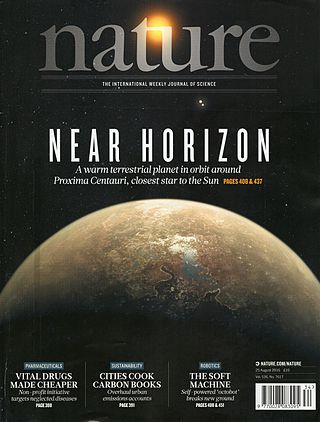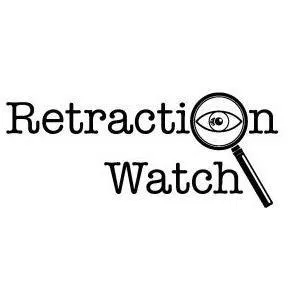
Nature is a British weekly scientific journal founded and based in London, England. As a multidisciplinary publication, Nature features peer-reviewed research from a variety of academic disciplines, mainly in science and technology. It has core editorial offices across the United States, continental Europe, and Asia under the international scientific publishing company Springer Nature. Nature was one of the world's most cited scientific journals by the Science Edition of the 2022 Journal Citation Reports, making it one of the world's most-read and most prestigious academic journals. As of 2012, it claimed an online readership of about three million unique readers per month.
In academic publishing, a retraction is a mechanism by which a published paper in an academic journal is flagged for being seriously flawed to the extent that their results and conclusions can no longer be relied upon. Retracted articles are not removed from the published literature but marked as retracted. In some cases it may be necessary to remove an article from publication, such as when the article is clearly defamatory, violates personal privacy, is the subject of a court order, or might pose a serious health risk to the general public.

Hindawi is a publisher of peer-reviewed, open access, scientific journals currently active in scientific, technical, and medical (STM) literature. It was founded in 1997 in Cairo, Egypt, and purchased in 2021 for $298 million by John Wiley & Sons, a large US-based publishing company.

PLOS One is a peer-reviewed open access mega journal published by the Public Library of Science (PLOS) since 2006. The journal covers primary research from any discipline within science and medicine. The Public Library of Science began in 2000 with an online petition initiative by Nobel Prize winner Harold Varmus, formerly director of the National Institutes of Health and at that time director of Memorial Sloan–Kettering Cancer Center; Patrick O. Brown, a biochemist at Stanford University; and Michael Eisen, a computational biologist at the University of California, Berkeley, and the Lawrence Berkeley National Laboratory.
MDPI is a publisher of open-access scientific journals. It publishes over 390 peer-reviewed, open access journals. MDPI is among the largest publishers in the world in terms of journal article output, and is the largest publisher of open access articles.
Frontiers in Psychology is a peer-reviewed open-access academic journal covering all aspects of psychology. It was established in 2010 and is published by Frontiers Media, a controversial company that is included in Jeffrey Beall's list of "potential, possible, or probable predatory publishers". The editor-in-chief is Axel Cleeremans.
Carlo Maria Croce is an Italian-American professor of medicine at Ohio State University, specializing in oncology and the molecular mechanisms underlying cancer. Croce and his research have attracted public attention because of multiple allegations of scientific misconduct.
Scholarly peer review or academic peer review is the process of having a draft version of a researcher's methods and findings reviewed by experts in the same field. Peer review is widely used for helping the academic publisher decide whether the work should be accepted, considered acceptable with revisions, or rejected for official publication in an academic journal, a monograph or in the proceedings of an academic conference. If the identities of authors are not revealed to each other, the procedure is called dual-anonymous peer review.

Harald Walach is a German parapsychologist and advocate of alternative medicine.

Retraction Watch is a blog that reports on retractions of scientific papers and on related topics. The blog was launched in August 2010 and is produced by science writers Ivan Oransky and Adam Marcus. Its parent organization is the Center for Scientific Integrity, a US 501(c)(3) nonprofit organization.
Frontiers Media SA is a publisher of peer-reviewed, open access, scientific journals currently active in science, technology, and medicine. It was founded in 2007 by Kamila and Henry Markram. Frontiers is based in Lausanne, Switzerland, with other offices in the United Kingdom, Spain, and China. In 2022, Frontiers employed more than 1,400 people, across 14 countries. All Frontiers journals are published under a Creative Commons Attribution License.
Yoshitaka Fujii is a Japanese researcher in anesthesiology, who in 2012 was found to have fabricated data in at least 219 scientific papers, of which 183 have been retracted.

The Séralini affair was the controversy surrounding the publication, retraction, and republication of a journal article by French molecular biologist Gilles-Éric Séralini. First published by Food and Chemical Toxicology in September 2012, the article presented a two-year feeding study in rats, and reported an increase in tumors among rats fed genetically modified corn and the herbicide RoundUp. Scientists and regulatory agencies subsequently concluded that the study's design was flawed and its findings unsubstantiated. A chief criticism was that each part of the study had too few rats to obtain statistically useful data, particularly because the strain of rat used, Sprague Dawley, develops tumors at a high rate over its lifetime.
Bharat B. Aggarwal is an Indian-American biochemist. His research has been in the areas of cytokines, the role of inflammation in cancer, and the anti-cancer effects of spices and herbs, particularly curcumin. He was a professor in the Department of Clinical Immunology, Bioimmunotherapy, and Experimental Therapeutics at University of Texas MD Anderson Cancer Center in Houston, Texas.
Springer Nature or the Springer Nature Group is a German-British academic publishing company created by the May 2015 merger of Springer Science+Business Media and Holtzbrinck Publishing Group's Nature Publishing Group, Palgrave Macmillan, and Macmillan Education.
Tumor Biology is a bimonthly peer-reviewed open access medical journal covering clinical and experimental oncology. It was established in 1980 as Oncodevelopmental Biology and Medicine, obtaining its current name in 1984. It is owned by the International Society of Oncology and BioMarkers, of which it is the official journal. Originally published by Karger Publishers, it moved to Springer Science+Business Media beginning in 2010. In December 2016, the journal moved again, this time to SAGE Publications. The editor-in-chief is Magdalena Chechlinska. According to the Journal Citation Reports, the journal has a 2016 impact factor of 3.650.
Jonathan Neal Pruitt is a former academic researcher. He was an Associate Professor of behavioral ecology and Canada 150 Research Chair in Biological Dystopias at McMaster University. Pruitt's research focused primarily on animal personalities and the social behavior of spiders and other organisms.
The Indian Journal of Medical Ethics is a quarterly peer-reviewed academic journal covering medical ethics and bioethics. It was established in 1993 by the Forum for Medical Ethics Society, an activist group campaigning to reform the Maharashtra Medical Council. The journal was originally entitled Medical Ethics, and its first issue was published in August 1993. It obtained its current title in January 2004. The editor-in-chief is Amar Jesani. The online version of the journal is open-access, the printed version is subscription-based; there are no article processing charges.
Ivan Oransky is an American physician, medical researcher and journalist, known for his advocacy of scientific integrity through improved tracking and institutional reforms. His opinions and statistics on scientific misconduct have been described in the media.




